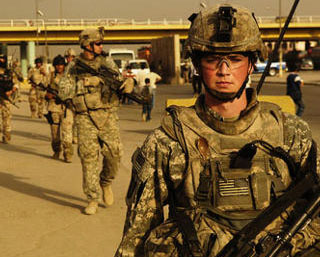By Katherine Harmon
There are currently 184,000 troops deployed in Iraq and Afghanistan, about 15 percent of whom have suffered brain injuries from concussions, physical injury or blast exposure. A new survey of about 1,000 soldiers with these injuries suggests that the effects can be lasting: Nearly all of them suffered from headaches, according to research released this week by the American Academy of Neurology.

THE PAIN CONTINUES: Some soldiers returning from duty in Iraq or Afghanistan complain of recurring headaches that can afflict them as frequently as 15 days a month.FLICKR/ARMY.MIL
The study, led by Capt. Brett Theeler, chief resident of the Madigan Army Medical Center Neurology Clinic at Fort Lewis in Tacoma, Wash., found that 30 percent of the surveyed soldiers suffered headaches at least 15 days out of the month, and at least 15 percent reported that the pain was bad enough to hamper their daily activities.
The cause of these headaches is complex, and not yet well understood, says Karen Tucker, a neuropsychologist at the Durham Veterans Affairs Medical Center in North Carolina, who was not involved in the study. Civilians might experience these sorts of headaches after a car accident or a concussion. But in the line of duty, soldiers can be exposed to more frequent physical injury as well as explosions—which range from improvised explosive devices (IEDs) to mortar fire—that can leave them with mild traumatic brain injury.
Fred Flynn, director of Madigan's Traumatic Brain Injury (TBI) program, describes such injury as "either a loss of consciousness or a transient alteration of consciousness," which leaves people "feeling dazed, like [they've] had their bell rung." But this doesn't include soldiers who have lost consciousness for more than 30 minutes or have an injury that can be detected on an MRI or CT scan.
Most of the headaches are "not that debilitating," says Tucker, who works with veterans suffering from persistent neurological problems. She calls the majority post-traumatic headaches "more of a significant annoyance" that should taper off and disappear within a year. Theeler notes that most of the soldiers seem to be treating their headaches on their own with ibuprofen (such as Advil and Motrin) and acetaminophen (such as Tylenol).
"These findings should alert health care providers," Theeler said in a statement, "to the need to identify and properly treat headache[s] among soldiers."
Although headaches are the most common complaint following a mild brain injury, Theeler and Flynn are also looking into the other symptoms, which can be physical (nausea, light sensitivity, balance problems); cognitive (difficulty concentrating, memory problems); and behavioral (irritability, impulsiveness, anxiousness, depression and post-traumatic stress disorder).
The research was based on a survey of 978 U.S. Army soldiers in the TBI program at Fort Lewis last year. Results will be presented at the American Academy of Neurology's annual meeting that runs April 25 to May 2 in Seattle.



